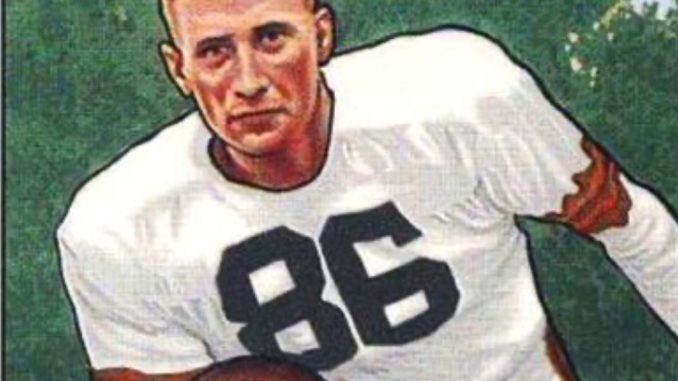
By GLENN GUILBEAU, Tiger Rag Editor
William Augustus “Dub” Jones, the NFL’s oldest living player and Cleveland Browns running back/receiver legend who created the flanker position in the 1950s after playing at LSU and Tulane, died early Saturday morning at his home in Ruston at age 99.
Former LSU wide receiver Ben Jones (1972-74), one of four of Jones sons who played college football including former LSU quarterback Bert Jones (1970-72), told Tiger Rag Saturday that his father had passed away with his wife Shumpert of 78 years and other family with him at their Ruston home, where they lived since 1952.
Dub Jones was born on Dec. 29, 1924, in Arcadia, Louisiana, grew up in nearby Ruston and graduated from Ruston High School in 1942 after leading the Bearcats to the 1941 state title as a halfback. He also played on the baseball and basketball teams and boxed. The nickname Dub came out of his “W” initial.
Jones is survived by five sons – William Jr. (Bill), Bert, Tom, Ben and Schump – and two daughters – Hasson Glasgow and Nancy Knox. There are 22 grandchildren, 48 great grandchildren. Dub met his wife, the former Schumpert Barnes of Ruston, in junior high in Ruston. They were married in 1946 and were two years away from their 80th wedding anniversary. Schump will turn 100 on Dec. 12.
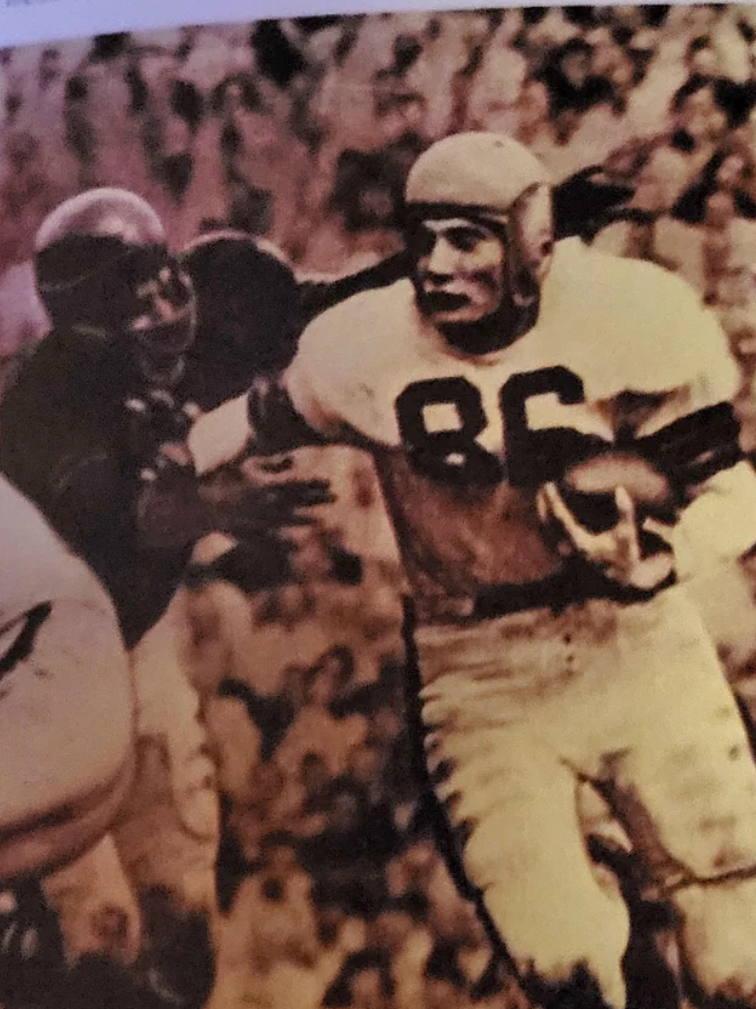
After one season at LSU in 1942, Jones entered the NCAA Transfer Portal – not exactly. He joined the United States Navy and transferred to Tulane to be a part of a Navy training program and became an All-American and All-Southeastern Conference back for the Green Wave in 1944 as a junior.
Jones is believed to be the only player in history to have a win over Tulane as an LSU player and a win over LSU as a Tulane player. In 1942, he was a backup for halfback Steve Van Buren when the Tigers beat Tulane, 18-6, in Tiger Stadium. In 1943, Jones rushed for 2- and 10-yard touchdowns and kicked three extra points for Tulane in a 27-0 victory over LSU at Tulane Stadium in New Orleans.
After the 1944 season at Tulane, Jones spent a year in submarine training in the Navy, which had the highest casualty rate of any U.S. military service in World War II. But he did not see action overseas because the war ended on Sept. 2, 1945 (V-J Day – Victory in Japan) after the U.S. dropped atomic bombs on Japan the previous Aug. 6 and 9.
The Chicago Cardinals took Jones with the second pick of the first round in the 1946 NFL Draft. He did not sign with the Cardinals, though, opting to play for the Miami Seahawks of the All-America Football Conference (AAFC). After a trade in his rookie season, Jones played for the Brooklyn Dodgers of the AAFC through 1947 before the Dodgers traded him to the Cleveland Browns prior to the 1948 season.
Cleveland legendary coach Paul Brown traded for Jones, partly because he liked how he played defensive back with the Dodgers, and something else.
“It may be folklore, but we always heard that Paul Brown said one of the reasons he traded for dad was because he said that any man who was 6-foot-4 that volunteers for submarine service for World War II has got to be his kind of guy,” Ben Jones said Saturday. “Dad was preparing to ship out to the South Pacific for an invasion of Japan (Operation Downfall) when the war came to an end.”
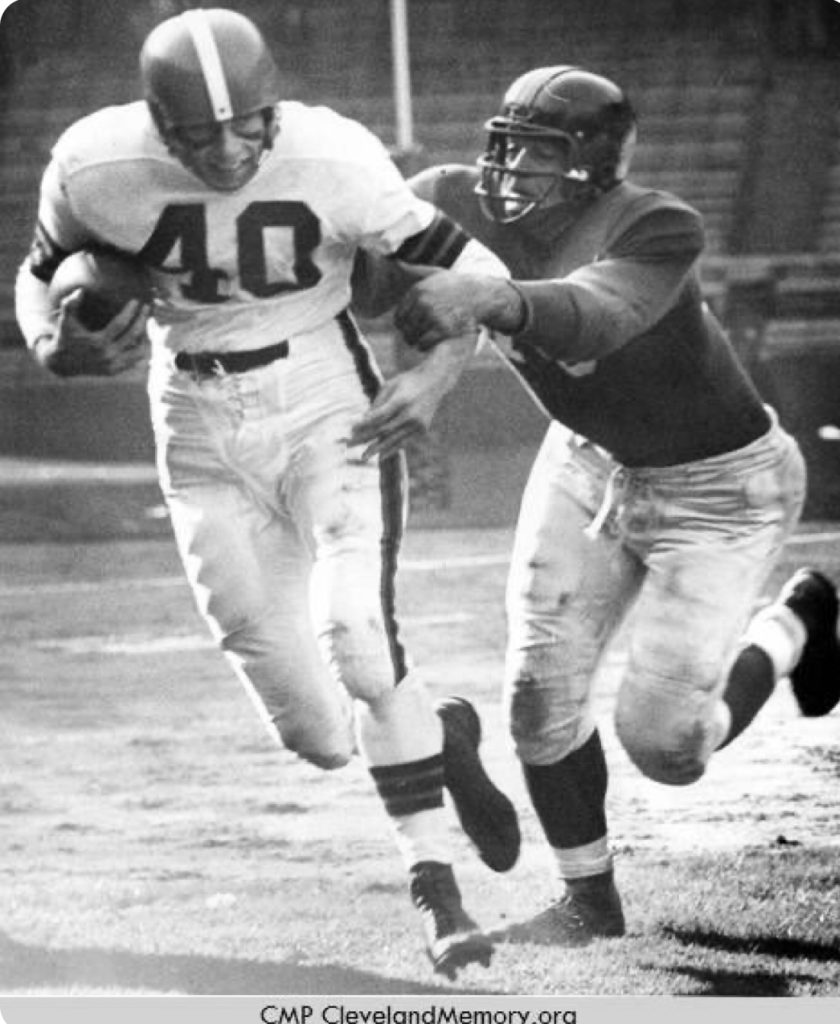
Jones played in eight consecutive championship games for the Browns from 1948 through 1955, winning five – two in the AAFC in 1948 and ’49 and three in the NFL in 1950, 1954 and 1955. Jones had a role in every NFL championship won by the Browns’ franchise – the three as a player and the 1964 title as a running backs and receivers coach when he coached running backs Jim Brown and Leroy Kelly and wide receiver Paul Warfield. All three would go on to the Pro Football Hall of Fame.
In six NFL seasons with the Browns, Jones rushed 540 times for 2,210 yards and 21 touchdowns and caught 171 passes for 2,874 yards and 20 touchdowns. He often lined up as a back away from the backfield as a “slot” receiver in today’s terminology. But when he played, that position behind the line became known as the flanker with the tight end and split end as the other two receivers on the line.
Jones still shares the NFL record for most touchdowns in a game with six against the Chicago Bears on Nov. 25, 1951, when he tied Ernie Nevers, who scored six for the Chicago Cardinals against the Bears on Nov. 28, 1929. In the Browns’ 42-21 win, Jones scored on runs of 43, 27, 12 and 2 yards and on passes of 43 and 34 yards from quarterback Otto Graham.
The Bears’ Gale Sayers scored six TDs in 1965 against San Francisco, and the Saints’ Alvin Kamara scored six against Minnesota on Christmas Day, 2020, with Dub watching in Ruston.
“I was pulling for him,” Dub Jones told Teddy Allen of the Shreveport Times at the time Kamara tied his record. “He’s my favorite player.”
Bert Jones and his sister Hasson later helped set up a Zoom call with their dad to congratulate Kamara.
Like Kamara, Jones had the run-and-receiver versatility. Jones was an All-Pro in 1951 and played in the Pro Bowl in 1951 and ’52.
He was an assistant coach with the Browns from 1963-68 before retiring from football and focusing on a lumber business he had started in Ruston in the 1950s. Jones was inducted into the Louisiana Sports Hall in Natchitoches in 1982 and into the Greater New Orleans Sports Hall of Fame in 1984.
“He was still riding his horse at age 94,” Bert Jones told the Tiger Rag recently. Jones followed in his dad’s NFL footsteps when the Baltimore Colts made him the second player taken in the 1973 NFL Draft out of LSU. Bert Jones (LSU, 1970-72) became an All-Pro and Pro Bowl player, like his dad before him, in 1976 when he was also named the NFL’s MVP and offensive player of the year. He played through 1981 with the Colts and finished in 1982 with the Los Angeles Rams.
“Dad had an uncanny memory,” Bert Jones said. “We’d be sitting around or watching a game, and he’d start talking about a touchdown pass that Dante Lavelli (Cleveland Browns split end and teammate of Jones) caught in 1950, or some other play. And we’d look up the game, and he was right on every time.”
Dub’s four sons who played college football were Bill Jones Jr., a defensive back at Louisiana Tech (1965-68) who later became a state senator in Louisiana, Bert Jones, a quarterback at LSU (1970-72), Ben Jones, a wide receiver at LSU (1972-74) and Tom Jones, a quarterback at Arkansas (1979-82).
The youngest son, Schump Jones, did not play college football, but was a Top Gun graduate from the Air Force in 1973 and later flew as demonstration pilot for the Thunderbirds.
“We are glad you had one son who was too small to play football, because we got him,” an Air Force officer said as he greeted Dub and his wife Schump after the graduation ceremony.
Dub Jones kept working in the family business well into his 90s.
“His mind was very sharp,” Ben Jones said. “I would say it was only about 18 months ago that he started slipping, and it accelerated here in the last three or four months. But he still had an amazing memory. I mean that guy was a walking almanac of north Louisiana sports history and NFL history. He could remember games, people, plays, exactly what happened. Reminded me a little bit of Jim Engster (Tiger Rag president/columnist and host of WRKF’s “Talk Louisiana). Dad had a photographic memory like Jim.”
Dub Jones will never be forgotten by those close to him.
“He was a great father. He was devoted to his family,” Ben Jones said. “He was hard working. He was an entrepreneur. There were challenges being a small business owner – financial stresses. But he was steady through it all.”
And he coached his sons up.
“He didn’t like self-promotion. He believed in team. Being part of a team,” Ben said. “Let your play speak for you. No dancing in the end zone. That used to drive him nuts. And also he didn’t want you being a hypochondriac. He said, ‘Look, your leg ain’t broke. Get up and walk off the field.'”
He loved attending his kids’ games – often juggling Ben’s games at LSU and Bert’s with the Colts.
“He spent a lot of time with us,” Ben said. “We had a family ranch we called The Farm. We had cattle and horses. We hunted and fished. He loved going to the sporting events, going to LSU games. I would classify him as an outstanding dad.”
Another member of the Greatest Generation is gone.
“He was maybe a little Old School,” Ben said. “I would call him a disciplinarian. I can’t ever remember him spanking me. The threat of it was enough. He had a tone of voice where you knew that if you needed to stop pushing here. But he was a great dad.”
In junior high while running a distance race, Ben gashed his knee on a fall and needed 20 stitches.
“When I got back to the house, his first question was, ‘Well, did you win the race?’ And I did,” Ben said.
“Despite Dub’s status as a sports icon, he remained remarkably down to earth,” wrote Prentiss Smith of the Shreveport Times last April. “He was always willing to lend an ear or share a laugh with anyone who was lucky enough to cross his path.”
Dub Jones died where he always wanted to go back to and stay – Ruston, despite an intriguing offer he received near the end of his assistant coaching career with the Browns in 1968.
“He could’ve been an NFL head coach,” Ben Jones said. “When he was a player, he told us Paul Brown would idle over to him during a game and say, ‘Dub, what do you think we should do here?'”
Jones called the offensive plays for the Browns from the press box as an assistant coach from 1963-68 under head coach Blanton Collier after Paul Brown was fired following the 1962 season.
When the Cincinnati Bengals franchise started in 1968 with Paul Brown as head coach, Brown called Dub Jones.
“Look Dub, I want you to come up, by my assistant, and you can take over when I retire,” Ben Jones said Paul Brown told his dad – then 44. “And he considered doing that. But at the end of the day, he decided not to. He loved Ruston, and had all the kids there and his business there. He said he just wanted to stay home.”

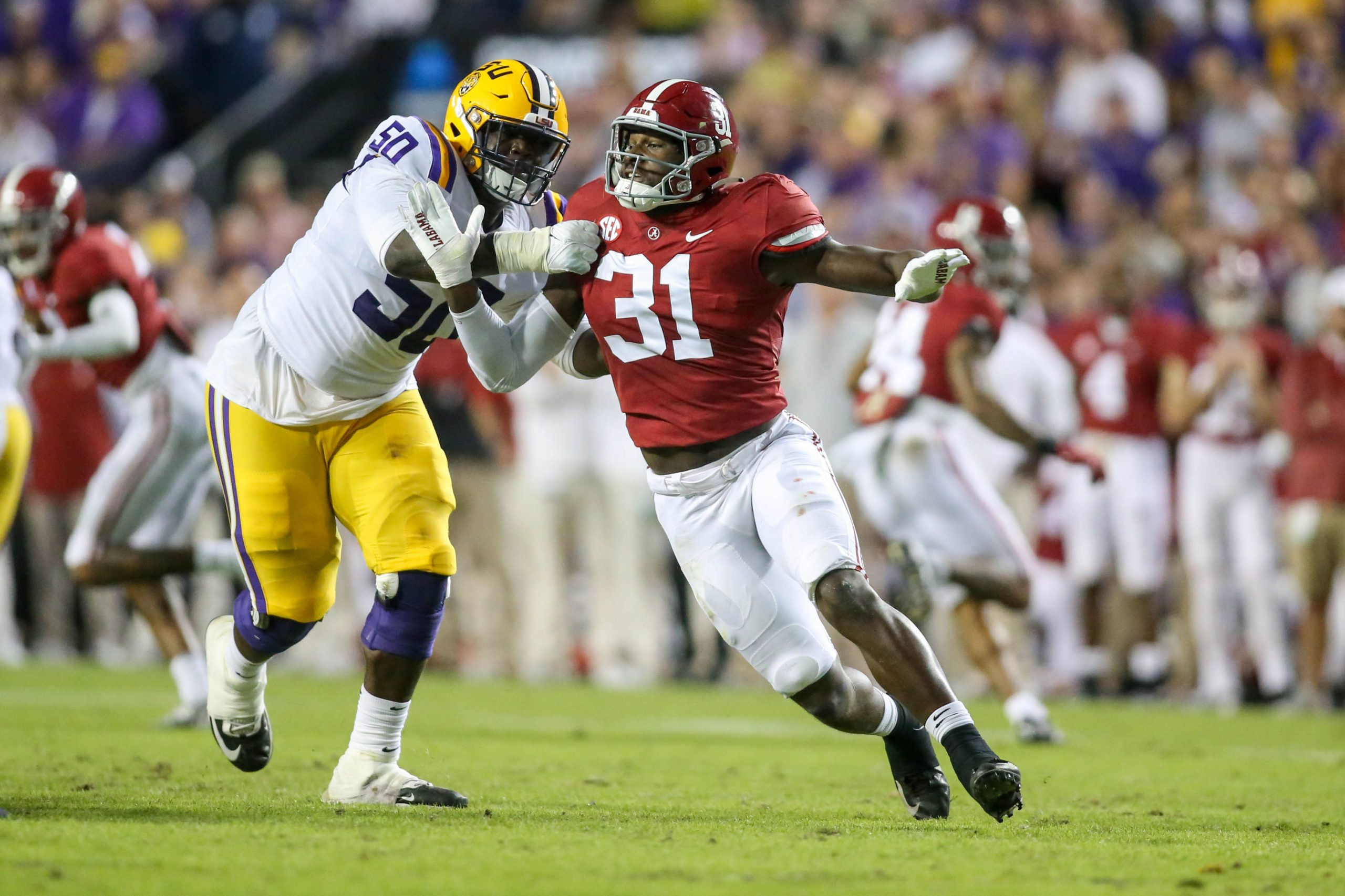
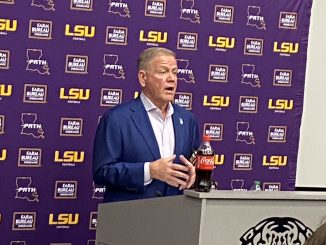

Be the first to comment